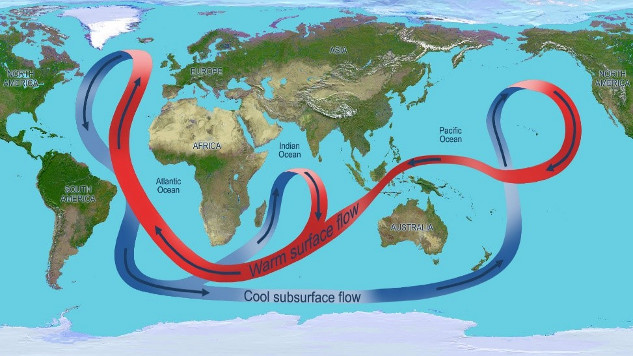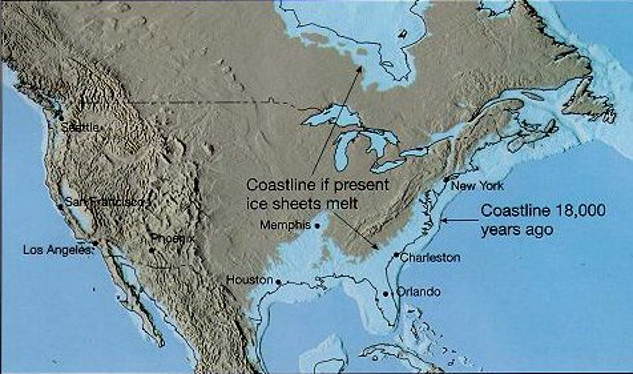
Have you ever heard of the Atlantic Meridional Overturning Circulation or AMOC? Don't worry if you haven't! It's not a daily discussion topic, but it's an integral part of our planet that scientists watch closely.
What is the AMOC?
The Atlantic Meridional Overturning Circulation, commonly known as AMOC, is an enormous and intricate system of ocean currents that plays a critical role in our planet's climate. Spanning the length of the Atlantic, it acts as a natural conveyor belt transporting warm water from the tropics to the North Atlantic. Imagine a massive, continuous cycle where warm, salty water moves northward on the ocean's surface, much like a conveyor belt in a factory. The water cools and becomes denser as it nears the poles, sinking deep into the ocean's abyss.
But the AMOC's role doesn't stop there. The descending cold water then travels southward deep beneath the ocean surface, creating a consistent flow that helps redistribute heat across our planet. This process is vital in transferring heat from the equator toward the poles. By doing so, the AMOC helps regulate global climate, ensuring a balance that sustains various forms of life and weather patterns on Earth. Without this continuous heat transfer, we would likely see drastic changes in climate and weather patterns, underlining the integral role the AMOC plays in our global climate system.
Understanding a Potential AMOC Shutdown
A shutdown of the Atlantic Meridional Overturning Circulation, or AMOC, represents a state where this significant "conveyor belt" mechanism ceases to function. This complex network of warm and cold water currents, vital to our planet's climate regulation, halts its movement. It's akin to a large-scale machine powering down, abruptly interrupting a process that has persisted for millennia. This shutdown scenario is not just theoretical; it's a real possibility that scientists worldwide are closely monitoring due to its potentially far-reaching implications on our global climate.
Several factors could lead to such a shutdown, and one of the most prominent among them is the influence of climate change. Glaciers melt at an increasing rate as global temperatures rise, releasing vast amounts of freshwater into the ocean. This influx of freshwater can significantly alter the ocean's salt concentration or salinity, which is a critical factor in the density of seawater. Density differences between warm, salty surface waters and cold, deep waters are essential drivers of the AMOC. If this balance is disrupted - for example, by the dilution of surface waters from melting ice - the density-driven forces propelling these currents could be sufficiently altered, potentially leading to a slowdown or even a complete shutdown of the AMOC.
An Imminent Threat: Ditlevsen & Ditlevsen's Groundbreaking Study
In a recent study that captured the scientific community's attention, Peter Ditlevsen and Susanne Ditlevsen delved deep into the future of the AMOC. Their groundbreaking research revealed concerns about the potential instability of this crucial climate-regulating system. They detected what they refer to as early-warning signals within the AMOC, indicators suggesting that this massive oceanic 'conveyor belt' may be heading towards a state of imbalance. This groundbreaking research adds a vital new perspective to our understanding of the AMOC and its potential future.
Perhaps most concerning is their prediction regarding the timing of a potential AMOC collapse. If current greenhouse gas emission scenarios persist, the Ditlevsens warn that an AMOC shutdown could occur around the middle of this century. This stark warning urges us to take note and truly understand what such a shutdown could mean for our planet and human civilization. The repercussions of an AMOC collapse would reverberate across our global climate system, potentially impacting everything from weather patterns to biodiversity. The Ditlevsens' research is a critical reminder of the urgent need to address our global emissions and strive toward a more sustainable future.

Climate Consequences of an AMOC Shutdown
The potential shutdown of the Atlantic Meridional Overturning Circulation (AMOC) could instigate a series of catastrophic events. This intricate system acts as Earth's natural thermostat, balancing our global climate by redistributing heat from the equator to the poles. If this process were to cease, it would create a domino effect of disruptions, influencing every corner of our global ecosystem. The consequences would reach far beyond just climatic changes; they would ripple through biodiversity, marine ecosystems, and human societies, leaving a profound impact on our world.
The range of potential outcomes is broad and interlinked, much like the interconnected currents of the AMOC itself. Each consequence, from altered weather patterns to shifts in biodiversity, can lead to another, creating a cascade of environmental, biological, and socio-economic changes. Understanding these potential consequences is a scientific interest and vital for our preparation and response strategies.
Dramatic Climate Shifts
The Atlantic Meridional Overturning Circulation, or AMOC, is a crucial engine for our planet's climate regulation. By driving warm tropical waters northward across the globe's surface and guiding colder waters southward in the deep ocean, the AMOC acts as Earth's central heating system. This heat redistribution is fundamental to maintaining relatively stable and life-supportive climates across vast portions of the planet, particularly in the North Atlantic region and Europe.
However, if this massive conveyor of oceanic warmth were to shut down, this critical heat transfer would abruptly halt. Without heat transport from the tropics, the North Atlantic and Europe could experience a significant cooling effect. This sudden temperature drop could resemble the conditions of a mini-ice age, with much colder winters and cooler summers. Areas once known for their mild climates could face harsh, icy conditions, disrupting ecosystems and human life. Due to their reliance on the AMOC's heat transfer, Europe and the North Atlantic region would be particularly hard-hit, facing a future with substantially colder temperatures and all the associated challenges.
Sea-Level Changes and Weather Disruptions
The implications of an AMOC shutdown would extend beyond temperature shifts, reaching far into our planet's seas and skies. One profound consequence would be significant alterations in sea levels. Water movement within the AMOC is critical in maintaining current global sea levels. If the AMOC were to collapse, the balance of oceanic water distribution could be disrupted, potentially causing sea levels to rise. This would pose a particularly severe threat to the U.S. East Coast, where the impact of a shutdown would be most pronounced. Coastal cities, such as New York and Miami, could be exposed to the dangers of flooding, storm surges, and even permanent inundation. This rising sea level could also devastate delicate coastal ecosystems, losing habitats and biodiversity.
Simultaneously, a potential shutdown of the AMOC could significantly alter global weather patterns. The warm water transported by the AMOC influences atmospheric systems, contributing to predictable seasonal changes and weather patterns. If the AMOC were to cease functioning, these patterns could be severely disrupted, shifting from currently mild climates to more extreme conditions. Areas that once enjoyed relatively predictable weather might face sudden and intense droughts, heat waves, or storms. This could exacerbate weather-related disasters worldwide, causing significant damage to infrastructure, agriculture, and human life, underscoring the global and interconnected impacts of potential changes in this vital oceanic system.

Altered Global Carbon Cycle
The Atlantic Meridional Overturning Circulation's influence stretches even to the invisible threads of our planet's carbon cycle. This vast system of currents absorbs a significant portion of the carbon dioxide (CO2) we release into the atmosphere, mainly through burning fossil fuels and deforestation. This CO2 is then carried down into the deep ocean, effectively removing it from the atmosphere and storing it safely away from the air we breathe. This process helps to moderate global temperatures, as CO2 is a potent greenhouse gas that traps heat in our atmosphere.
However, if the AMOC were to collapse, this critical carbon sink could be drastically reduced or even cease altogether. Without the AMOC's powerful currents to absorb and sequester CO2, more greenhouse gas would remain in the atmosphere, potentially exacerbating global warming. The implications of such a scenario are staggering: our efforts to combat climate change and reduce global warming face significant challenges. If our natural carbon storage system in the Atlantic were to fail, these efforts could become even more complicated, accelerating the urgency of reducing CO2 emissions and finding alternative carbon capture and storage methods.
Impacts on Marine Biodiversity
The vast expanse of our oceans, teeming with life from the surface to the seafloor, would not be spared from the impact of an AMOC shutdown. The AMOC's currents serve a vital ecological function: they transport nutrients from the depths to the surface waters, nourishing life at every level. These nutrients, rich in nitrogen, phosphorous, and other elements, fuel the growth of microscopic plants known as phytoplankton, which form the base of the oceanic food chain. The blooming of phytoplankton, in turn, supports a diverse array of marine life, from tiny zooplankton to enormous whales.
If the AMOC were to shut down, this nutrient transport could be severely disrupted. Without the essential nutrients from the AMOC's currents, phytoplankton populations could decline, triggering a domino effect through the marine food chain. Reduced phytoplankton levels could lead to fewer zooplankton, which could then affect the small fish, and so on, up to the apex predators. This could lead to drastic shifts in marine biodiversity as species struggle to adapt to rapidly changing conditions. Furthermore, these changes could have severe implications for commercial fishing industries, as shifts in fish populations could disrupt established fishing grounds and threaten the livelihoods of those who depend on them. For regions heavily reliant on seafood as a primary source of protein, this could also pose significant threats to food security, showcasing the far-reaching implications of an AMOC shutdown for marine life and human societies.
Socio-Economic and Human Impacts
The implications of an AMOC shutdown are not limited to physical and biological sciences. This climatic event could send shockwaves through human societies across the globe, affecting various facets of our lives. A fundamental example of this lies in the agricultural sector. As changes in weather patterns and sea levels can lead to more frequent and severe droughts, floods, and storms, agricultural production could be significantly disrupted. Crop yields may plummet in regions affected by extreme weather, making it harder for farmers to provide for a steadily growing global population. This could exacerbate food security issues and potentially lead to price inflation in the global food market. As a result, ensuring food security worldwide could become an increasingly complex challenge with significant humanitarian implications.
Similarly, rising sea levels and shifting weather patterns could force mass migrations, mainly from coastal cities and areas prone to severe weather conditions. This displacement could lead to socio-economic upheaval, with affected individuals and communities facing economic hardships and mental and physical health challenges. Furthermore, the financial implications are staggering when considering potential impacts on global trade, infrastructure, and various industries. For instance, central to international trade, port cities could be threatened by rising sea levels, while extreme weather could disrupt supply chains and manufacturing processes. The potential collapse of the AMOC thus brings into sharp focus the urgent need for comprehensive, proactive, and globally coordinated climate strategies.
The Road Ahead: Current Research and Predictions
Scientific research is crucial in monitoring the health of the AMOC and predicting future changes. While models help us understand potential outcomes, more research is needed to refine these predictions further and develop strategies to prevent or mitigate an AMOC shutdown. It's an area of climate science that requires more attention, and this recent study by the Ditlevsens underlines the urgency of the issue.
The AMOC may seem abstract, but its potential shutdown could have real-world implications for our climate, ecosystems, and lives.
About the Author
 Robert Jennings is co-publisher of InnerSelf.com with his wife Marie T Russell. He attended the University of Florida, Southern Technical Institute, and the University of Central Florida with studies in real estate, urban development, finance, architectural engineering, and elementary education. He was a member of the US Marine Corps and The US Army having commanded a field artillery battery in Germany. He worked in real estate finance, construction and development for 25 years before starting InnerSelf.com in 1996.
Robert Jennings is co-publisher of InnerSelf.com with his wife Marie T Russell. He attended the University of Florida, Southern Technical Institute, and the University of Central Florida with studies in real estate, urban development, finance, architectural engineering, and elementary education. He was a member of the US Marine Corps and The US Army having commanded a field artillery battery in Germany. He worked in real estate finance, construction and development for 25 years before starting InnerSelf.com in 1996.
InnerSelf is dedicated to sharing information that allows people to make educated and insightful choices in their personal life, for the good of the commons, and for the well-being of the planet. InnerSelf Magazine is in its 30+year of publication in either print (1984-1995) or online as InnerSelf.com. Please support our work.
Creative Commons 4.0
This article is licensed under a Creative Commons Attribution-Share Alike 4.0 License. Attribute the author Robert Jennings, InnerSelf.com. Link back to the article This article originally appeared on InnerSelf.com

Related Books:
The Future We Choose: Surviving the Climate Crisis
by Christiana Figueres and Tom Rivett-Carnac
The authors, who played key roles in the Paris Agreement on climate change, offer insights and strategies for addressing the climate crisis, including individual and collective action.
Click for more info or to order
The Uninhabitable Earth: Life After Warming
by David Wallace-Wells
This book explores the potential consequences of unchecked climate change, including mass extinction, food and water scarcity, and political instability.
Click for more info or to order
The Ministry for the Future: A Novel
by Kim Stanley Robinson
This novel imagines a near-future world grappling with the impacts of climate change and offers a vision for how society might transform to address the crisis.
Click for more info or to order
Under a White Sky: The Nature of the Future
by Elizabeth Kolbert
The author explores the human impact on the natural world, including climate change, and the potential for technological solutions to address environmental challenges.
Click for more info or to order
Drawdown: The Most Comprehensive Plan Ever Proposed to Reverse Global Warming
edited by Paul Hawken
This book presents a comprehensive plan for addressing climate change, including solutions from a range of sectors such as energy, agriculture, and transportation.


























